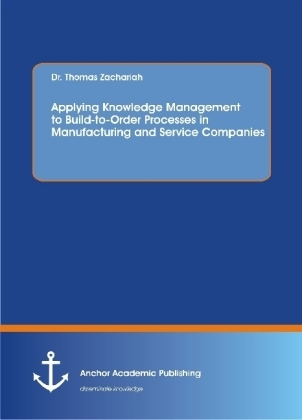
Applying Knowledge Management to Build-to-Order Processes in Manufacturing and Service Companies
Anchor Academic Publishing (Verlag)
978-3-96067-116-9 (ISBN)
The purpose of this study is defining the practical, pragmatic and replicable approaches to knowledge management as it relates to the build-to-order and mass customization strategies of manufacturing and services companies in the United States. The overall research question guiding this study is: How is knowledge management being used today to streamline and make more efficient service strategies of manufacturing and services companies? The research is descriptive and empirical in nature because the primary data were collected using the survey method through fact finding technique such as a questionnaire. The results show the integration of increasing role-based knowledge management in the workflow of a company.
From this study, a knowledge sharing maturity model is derived, which illustrates how the level and extent of the exploitation of knowledge in build-to-order and quote-to-order strategies have a long-term impact on the financial performance. Based on these findings, a causal relationship emerges from how a company manages its knowledge in the build-to-order and quote-to-order strategy based on these findings, and they align well to a multi-stage maturity model as a result. One of the main objectives of the study is to determine how the customer churn rate can be reduced. By optimizing business processes, companies can improve increase customer satisfaction while reducing the Days Sales Outstanding levels over time.
Dr. Thomas Zachariah is an Information Technology Management and Technical Professional who has received his PhD in Management from Central University of Nicaragua, Nicaragua and his Doctorate of Management from Swiss Management Center University, Switzerland. He is also a certified Project Manager from Stanford University, USA.
Text Sample:
Chapter 3: Research Methodology:
The impact of knowledge-management strategies on the build-to-order process delivers significant operational and financially-based gains over time. Being able to design a specific build-to-order process so that it can deliver the maximum results possible is predicated on understanding several critical factors in a business adopting this approach to unifying selling and production. To attain the highest perfect order accuracy, companies adopting the build-to-order process as a selling and service process must first concentrate on the role-based use of knowledge management throughout their enterprises.
Role-based use of knowledge alleviates the potential for errors in order processing and reduces the churn of incorrect orders that must be corrected by a median of seven or more times, and increases the accuracy of long-term product planning and new product launching (Columbus, 2008). The Perfect Order metric captures the extent to which role-based knowledge is being shared throughout an organization. The greater the agility, accuracy, and speed with which a company is using role-based knowledge, the greater the Perfect Order accuracy, operations, and financially-based performance it attains.
The intention of this methodology is to factor the use of role-based knowledge in the build-to-order process, and thereby determine how enterprise, legacy, and previous isolated systems are optimized for performance. Dashboard and the hierarchy of supply-chain metrics are excellent metrics for measuring the broader trends impacting a company over time to be implemented with an internal framework which can quantify performance gains over time. Therefore, this methodology also concentrates on creating this framework of measurable performance gains that are directly attributable to a more accurate and efficient build-to-order process over the long term. Chapter 3 offers a brief description of the adopted research methodology activities, such as research design, research question and sampling strategy, research instrument, data collection procedures, and data analyses.
Research Question:
How is knowledge management being used today to streamline and make more efficient the service strategies of manufacturing and services companies? [...].
Research Design:
The research design includes detailed plans on what, where, and how data are to be collated (Creswell, 2009). In creating this research design, several key assumptions have been made about the use of knowledge-management strategies within the build-to-order process.
At first, knowledge management must be role-based to be as effective as possible in automating the build-to-order process. As previous research has shown, the greater the role-based use of knowledge management, the greater the accuracy, efficiency, and transaction velocity achieved (Hofman, 2004; Columbus, 2008).
The second assumption is that the contributory effects of knowledge management are not linear, but follow an experience curve effect, gradually increasing over time as enterprises gain greater insights into how to align resources to needs. This assumption that growth is not linear is also fundamental to evaluating the impact of role-based knowledge being applied to the build-to-order process. It can be reasonably assumed that the elasticity of knowledge is greater the more rapidly an organization attempts to launch new products and gain market share. This is correlated to the experience effect and points to the need to understand the elasticity of knowledge by role to understand how the build-to-order process can be optimized over time.
The third assumption is that the legacy, internally-developed, and enterprise-wide ERP systems have a significant effect on the overall performance of the build-to-order process. For this study, the ERP systems in use by respondent organizations will be considered and analyzed as part of the results. ERP system integration is also one o
| Erscheinungsdatum | 20.03.2017 |
|---|---|
| Sprache | englisch |
| Maße | 155 x 220 mm |
| Gewicht | 146 g |
| Themenwelt | Sozialwissenschaften ► Kommunikation / Medien |
| Wirtschaft ► Betriebswirtschaft / Management ► Spezielle Betriebswirtschaftslehre | |
| Schlagworte | Build-to-order • Distributed Order Management • Enterprise Resource Planning • intelligent manufacturing • knowledge management • optimize • Product Configuration • Quote-to-Order |
| ISBN-10 | 3-96067-116-4 / 3960671164 |
| ISBN-13 | 978-3-96067-116-9 / 9783960671169 |
| Zustand | Neuware |
| Haben Sie eine Frage zum Produkt? |
aus dem Bereich
